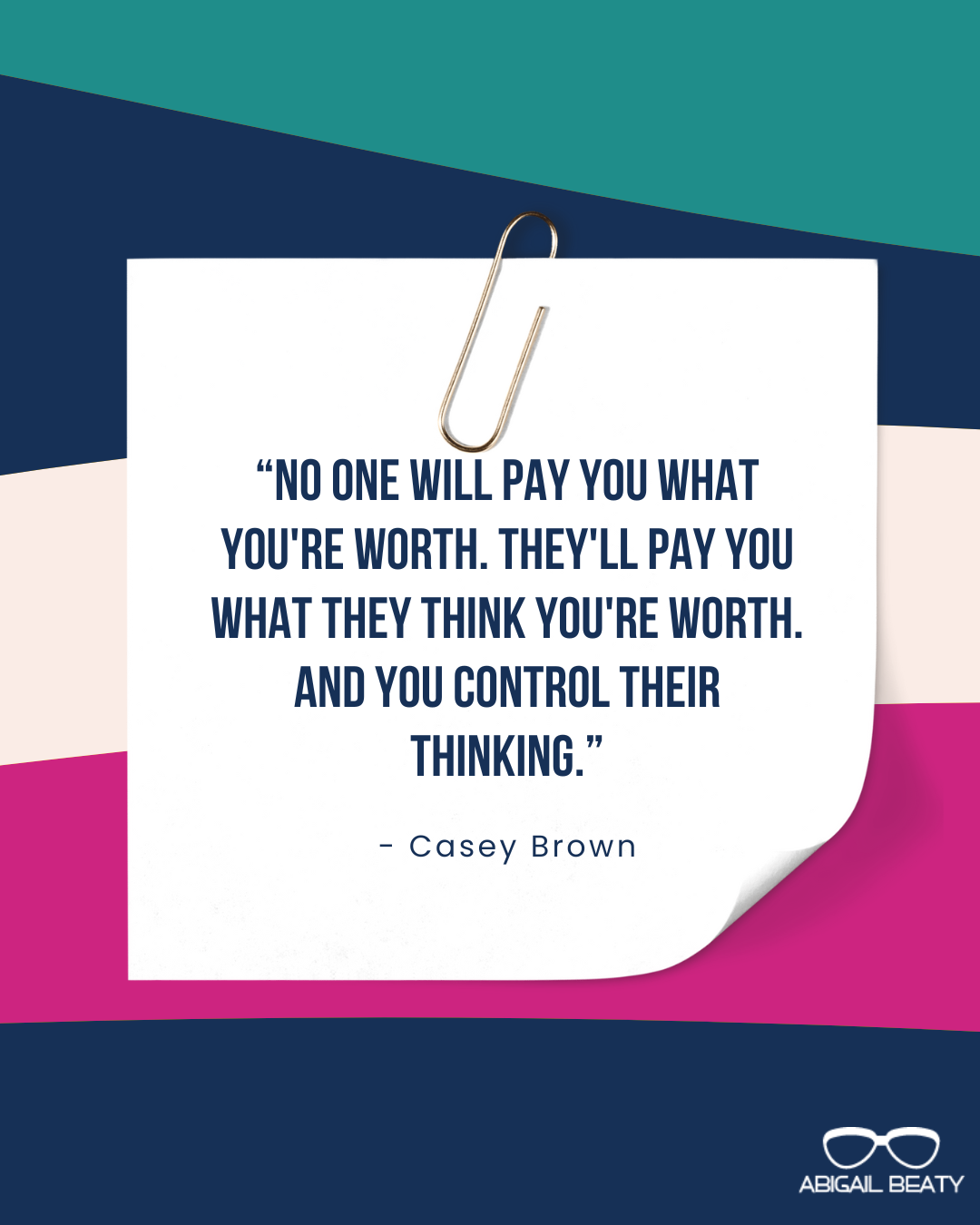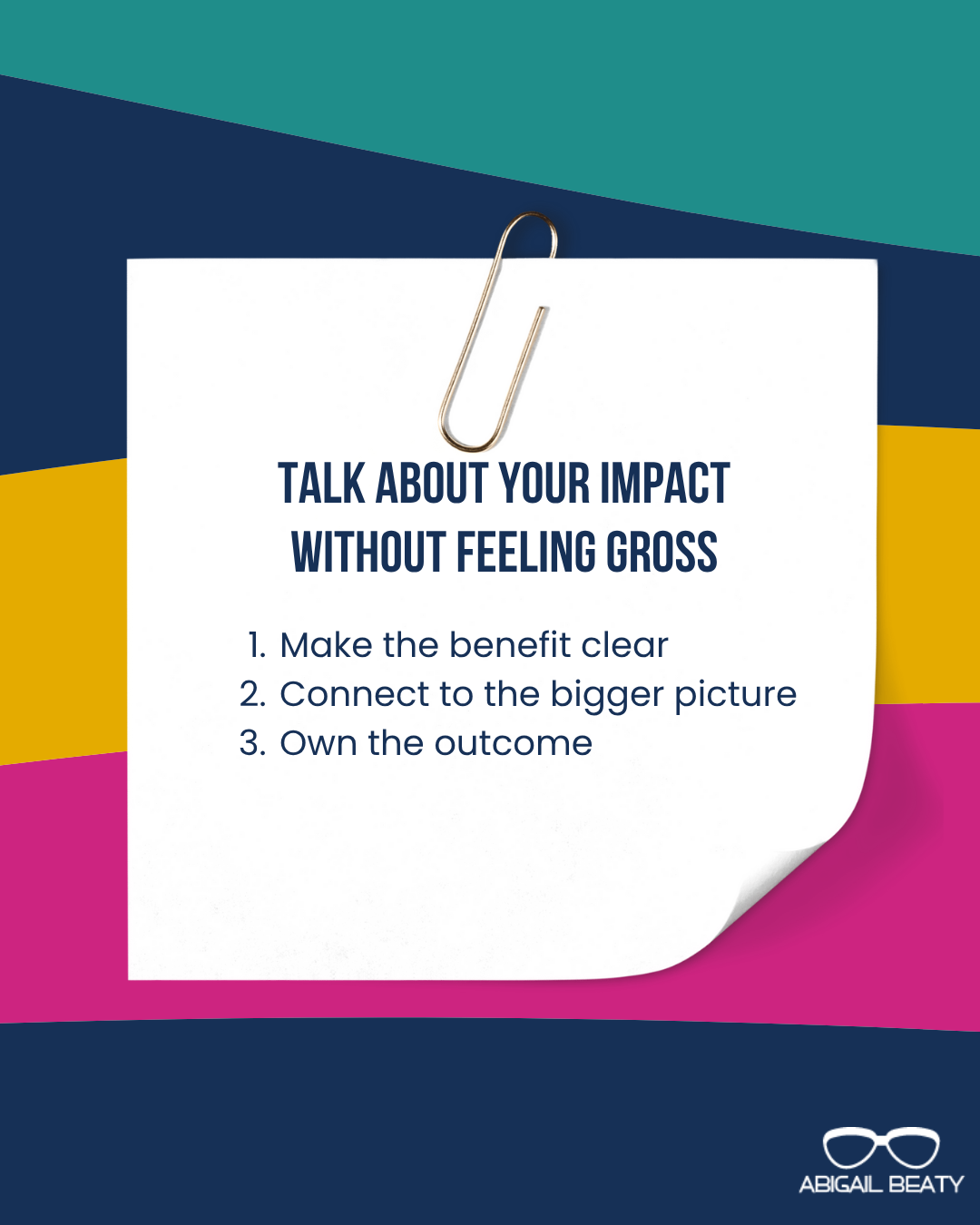Mid-Career Clarity: Speak Up, Stand Out

How to Articulate and Share Your Impact
You’ve done the work.
You’ve launched the projects, solved the problems, and helped your team or company move forward. But when someone asks, “So what did you accomplish last year?”…you freeze.
Or maybe you minimize.
Or ramble.
Or deflect with a vague, “Oh, it was a team effort.”
Sound familiar?
If you’ve ever struggled to articulate your value, you are not alone—and you’re not bad at your job. You’re just out of practice at telling your story.
This is Part 5 of my Mid-Career Clarity series. Start from the beginning here. Also, there's a lot of proactive tips in this post - grab a notebook and get ready to take action!
The Visibility Gap That Holds Too Many People Back
There’s a persistent belief that your work should speak for itself. That if you deliver results, the right people will notice.
But in most workplaces, performance and recognition don’t always go hand in hand.
According to Gallup’s State of the Global Workplace 2025, only 1 in 4 employees strongly agree that they feel recognized at work. And recognition is strongly correlated with engagement, productivity, and retention.
And McKinsey and Lean In's Women in the Workplace 2024 report shows that even among high performers, many women and professionals of color are less likely to be credited for their ideas or visible wins, often because they don’t have the same sponsorship or systems of support.
Translation? You need to make your impact visible. Not with arrogance, but with clarity, confidence, and strategy.
Why It Feels Hard (Even When You Know You’re Good at What You Do)
Talking about your own accomplishments often triggers discomfort:
- “I don’t want to seem boastful.”
- “I can’t remember what I did six months ago.”
- “I don’t know how to explain the value I added.”
This isn’t a character flaw. It’s a skill gap. One that no one teaches—but that you can absolutely learn.
Storytelling Is the Secret Weapon
The best way to communicate your impact isn’t with jargon or laundry lists. It’s with stories.
Specifically, success stories that follow a simple structure:
✅ C.A.R. — Challenge | Action | Result
- Challenge: What was the problem or opportunity?
- Action: What did you do?
- Result: What changed because of your contribution?
Example:
"New hires were feeling overwhelmed and confused during their first week, which slowed everyone down. I put together a simple welcome guide, paired them with peer mentors, and worked with my manager to adjust the first-week schedule. It made a big difference. New employees felt more confident, and our team saved hours each week by cutting down on repeated questions and rework."
Notice: It’s clear, concise, and focused on outcomes, not ego.
Introducing the Wins Journal
The most effective leaders don’t just communicate well, they track well.
That’s where a Wins Journal comes in. It’s a simple habit that builds visibility over time and reduces the scramble at review season or job-search time.
Each week, capture:
- ✅ What you led, solved, fixed, or improved (professional AND personal)
- 🧠 What skills or values you used
- 📊 Any measurable or meaningful outcomes
- 💬 Feedback you received or shared
Sample entry:
Led an enablement session for the customer success team to walk through new support workflows. Kept it clear and interactive, and made sure there was space for questions and feedback. A manager told me afterward, “You made something complicated feel easy—and now the team actually feels ready to use it.”
After a few weeks, you’ll have a bank of proof points, quotes, and examples ready to repurpose for:
- Performance reviews
- LinkedIn updates
- Interview answers
- Promotion discussions
- Grant or award applications
And perhaps most importantly: for your own confidence.
How to Talk About Your Impact Without Feeling Gross
There’s a time for humility. And a time to make your impact clear. A performance review, job interview, or promotion conversation isn’t the moment to downplay what only you could have done.
If your success sounds like something anyone could’ve pulled off, why should they choose you for what’s next?
Here’s how to talk about your wins in a way that feels honest, grounded, and compelling:
1. Make the Benefit Clear
Start with who or what improved because of your effort.
“I led an enablement session that helped the support team cut down response time and feel more confident using the new process.”
2. Connect to the Bigger Picture
Show how your work contributed to a broader goal or outcome.
“I streamlined our team’s update process so leadership could quickly see progress and unblock next steps.”
3. Own the Outcome
Don't soften your role, name it. Let the result reflect your leadership, skill, or insight.
“I wrote the training materials that cut onboarding time by 25%. I knew where people were getting stuck and fixed it.”
Self-promotion isn’t about being loud. It’s about being clear. When you own your impact, you make it easier for others to see your value and advocate for your next opportunity.
Real-life Example: Reclaiming the Narrative
Background:
Monica had been in her role for 3 years, delivering results but constantly overlooked for stretch projects. She told her manager, “I feel like I’m invisible.”
The Shift:
She began tracking weekly wins using a template. During check-ins, she’d highlight one example and ask strategic questions like, “Where else could we apply this?”
The Outcome:
Within 3 months, Monica was invited to co-lead a cross-department initiative and her visibility in the org increased tenfold.
Action Steps: Make Your Value Visible
Ready to apply this in your own career? Start here:
-
Begin a Wins Journal
Just 5–10 minutes each week. Choose a method: notebook, spreadsheet, doc, whatever works for you.
-
Write a CAR Story
Pick one recent success. Frame it using: Challenge → Action → Result.
-
Practice Sharing a Win
Use a team meeting, 1:1, or networking conversation to naturally share something you’re proud of.
-
Ask for Feedback
Reach out to a trusted peer or leader: “What’s one thing I do well that you think I underplay?”
Final Word: Visibility Is a Skill
You’ve already done the work. You’ve created results. The next step is to make sure people see it so you can grow, lead, and create the kind of career that reflects your full value.
You don’t have to be the loudest voice in the room. You just have to speak clearly about what you bring.
This is Part 5 of the Mid-Career Clarity series. Find the rest of the series here: Part 1, Part 2, Part 3 and Part 4.
📝 Want help identifying your wins and strengths? Download the free Fast Track Your Career Clarity worksheet —a quick, 10-minute tool to help you recognize what you’re great at (and why it matters).


